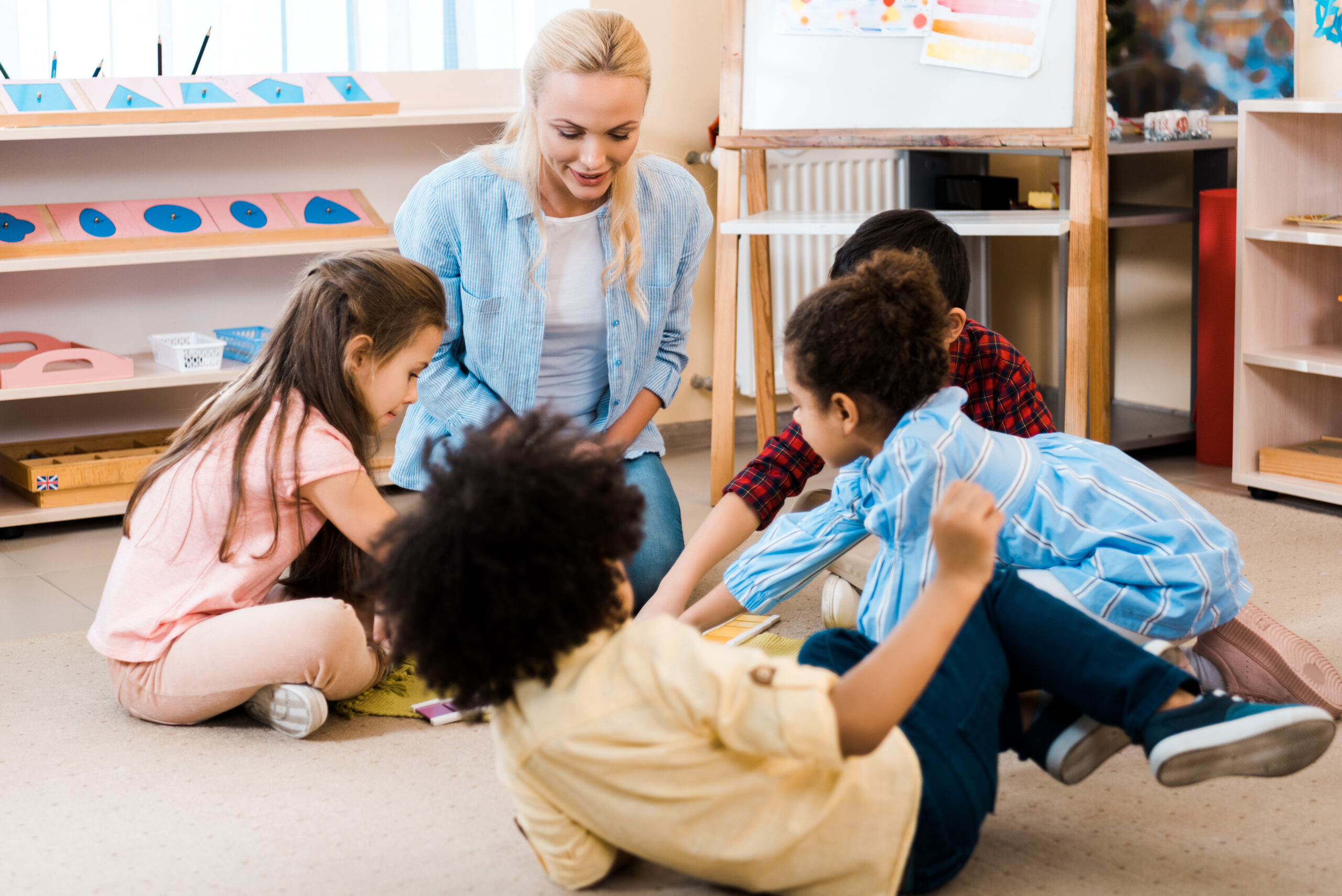Developing children’s independence and self-confidence is essential for their success both inside and outside the classroom. With a special emphasis on the child-centered learning environment, practical life activities, and caring for the environment, Montessori classrooms are designed to help build independence and self-confidence in students. This article explores the key areas we focus on and the role that parents can play outside the classroom.
The Montessori Approach to Independence and Self-Confidence
Montessori education places a strong emphasis on nurturing a child’s natural desire for independence and self-discovery. Unlike traditional teaching methods, which may be more teacher-directed, Montessori classrooms encourage children to take an active role in their learning.
Child-Centered Learning Environment
Our classrooms at Rockingham Montessori School are designed to promote exploration and learning at the child’s own pace. One example of this is the arrangement of low shelves that contain carefully chosen classroom materials. These materials are organised in a way that makes it possible for children to access and return them independently. Giving children the freedom to choose helps them develop decision-making skills and a sense of autonomy.
Instead of being obligated to follow rigid schedules or a standardised curriculum, Montessori students are encouraged to explore subjects that captivate their curiosity and follow their interests. In addition to boosting a child’s self-confidence, this approach fuels their passion for learning and instils the belief that their ideas and choices matter.
Practical Life Activities
Another key component of Montessori education is our focus on undertaking practical life activities, which serve as the foundation for independence and self-confidence. The activities are everyday tasks that children are usually already familiar with, such as pouring, buttoning, and tying shoelaces. Although seemingly mundane, these activities play a significant role in a child’s development.
Practical life activities help children develop essential life skills that help them become independent. They discover the joy of accomplishing tasks on their own, which strengthens their confidence. When a child ties their shoes for the first time or pours their own drink without spilling, they feel proud and accomplished. As a result, they feel more confident and motivated to take on new challenges.
Caring for the world around them
A key component of Montessori education is instilling responsibility and respect for the environment and the world surrounding it. Students in a Montessori classroom participate actively in caring for their own personal environment, fostering pride and ownership. It teaches them to maintain order and harmony in the classroom, clean up after themselves, and put back materials properly.
By caring for their environment, children develop an awareness of their impact on the world around them. This sense of responsibility nurtures a deep respect for their surroundings and an understanding of their role as caretakers of the environment more broadly. As a result, children grow to be more mindful and considerate individuals, building their self-confidence in their ability to positively contribute to the world.
Self-Paced Learning
Montessori classrooms offer different learning experiences, allowing each child to progress at their own pace. This tailored approach helps build self-confidence as children experience success in their learning journey.
Celebrating Effort and Progress
In Montessori education, the focus is not solely on academic achievement but also on the effort put forth by the child. Teachers celebrate every child’s progress and accomplishments, reinforcing a positive self-image.
Encouraging Risk-Taking
Montessori classrooms create a safe space for children to take risks and make mistakes. Children are encouraged to take on challenges and learn from their experiences, which nurtures a growth mindset and self-assurance.
Supporting Independence and Self-Confidence at Home
As parents, you can play a crucial role in supporting the development of independence and self-confidence in your child. There are several things you can do to assist your child’s growth at home as well.
Encourage Decision-Making:
You should allow your child to make decisions at an age-appropriate level, such as choosing their clothes or choosing activities they will pursue. This fosters a sense of responsibility and autonomy, which nurtures their decision-making abilities.
Promote Problem-Solving:
Encourage your child to solve problems on their own. Rather than immediately intervening, guide them through the problem-solving process to boost their confidence and help them develop problem-solving skills.
Offer Opportunities for Independence:
Whenever possible, give your child opportunities to practice independence, such as preparing their own snacks or tidying up their play area. Be patient and supportive as they develop their skills, as it is through practice that their self-confidence will develop.
Speak to us and book a tour of our school
Children who receive Montessori education become self-confident, independent, and lifelong learners. Montessori classrooms cultivate capable and confident students by creating a positive, free-flowing learning environment, emphasising practical life activities, and fostering a sense of responsibility for the environment and world around them. You can encourage decision-making, promote problem-solving skills, and provide opportunities for independence as parents to support this development. It is our goal to lay the foundation for your child’s academic success and personal growth together, and by playing your part around the home and away from the classroom, you can help instil this message to your children to set them up for the future.
If you are interested in the benefits of Montessori education and would like to experience our school firsthand, we invite you to take the next step. Contact Rockingham Montessori School today to book a tour of our campus. During the tour, you will have the opportunity to explore our nurturing learning environment, observe our engaged students in action, and meet our dedicated educators who are committed to supporting your child’s growth and development.

